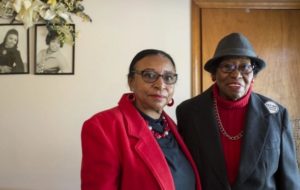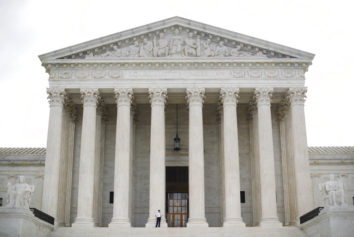
Armenta Eaton and her mother, Rosanell Eaton, 94, at their home in Louisburg, N.C. The elder Eaton is a plaintiff in the lawsuit over North Carolina’s voter-ID law. (Nikki Kahn/The Washington Post)
The North Carolina NAACP has filed a lawsuit accusing state Republicans of passing laws designed to stifle minority voters and keep white legislators in power, according to news reports.
ThinkProgress said the North Carolina NAACP is being represented by the Advancement Project in the trial, which started Monday. Attorney Denise Lieberman said Republican legislators have passed some of the strictest voter-ID laws in the country. They claimed the laws were necessary to protect against voter fraud, but Lieberman said they were really designed to suppress Black and Latino voters.
“This is illuminated by the fact that there’s no legitimate basis for having this law,” she said. “We have expert witnesses who will testify that the state’s rationale for the law is unsupported, that there is absolutely no evidence of in-person voter impersonation that would justify this law. Furthermore, these laws don’t advance or expand people’s confidence in the voting process, as the state is arguing. They actually reduce it. So the conclusion we must draw is that lawmakers knew what they were doing.”
According to an article by the Institute for Southern Studies, changing demographics and increased Black voter participation is threatening to turn states like North Carolina blue. According to data from the North Carolina State Board of Elections, Latino voters had a 74.1 percent growth rate in the mid-term elections. Black voters showed a 16.4 percent growth rate. White voters had the lowest growth rate at 5.6 percent.
Lieberman said Republicans responded to this by simply making it harder for minorities to vote, since Blacks and Latinos tend to vote Democrat. She alleges Republicans were concerned that demographic changes and a recent minority voter drive would dilute their power base.
“To remedy past suppression of voters of color, the state implemented same-day registration, out-of-precinct voting, the pre-registration of 17-year-olds, and an extra week of early voting,” Lieberman told ThinkProgress. “These are the very measures the legislature sought to repeal — the ones most important for opening the doors of access.”
Republican legislators were also aided by the Supreme Court, which struck down key areas of the Voting Rights Act which restricted Southern states that had a history of race-based voter suppression laws. The Supreme Court decision was criticized by former Attorney General Eric Holder.
According to Reuters, Thomas Farr, a lawyer representing the state, said the new voter-ID law is not discriminatory, because it only affects a small number of people. However, the Rev. William J. Barber II, president of the North Carolina NAACP, described the law as “a modern form of Jim Crow,” according to The Washington Post. He said the voter-ID law takes away the basic right to vote.
“The right to vote is one of the sacred rights that we hold dear as a nation,” said Jocelyn Samuels, former acting assistant attorney general for the Justice Department’s civil rights division. “North Carolina adopted these changes in a rushed process, despite evidence before the legislators that a number of these changes will harm minority voters.”
Rosanell Eaton, a plaintiff in the suit, has been voting for 70 years and recounts having to recite the preamble to the Constitution of the United States, back in the days when authorities made Black voters jump through hoops to vote. She had to make 10 trips to the Division of Motor Vehicles, drive more than 200 miles and spend 20 hours obtaining a form of ID that enabled her to vote.
“The spelling of her name on her various underlying documents didn’t match the way her name was portrayed on her voter registration,” said Denise Lieberman, a senior attorney with the Advancement Project, in a Washington Post article. “And that’s one of the more common reasons that people have these difficulties complying with North Carolina’s voter-ID law.”


